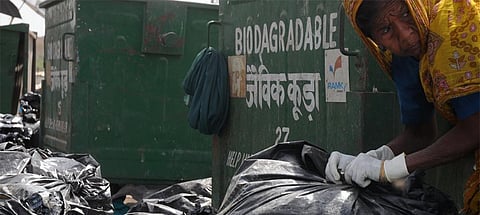

The Supreme Court has made it mandatory for all municipal corporations and state pollution control boards to use the ‘COVID19BWM APP’ for tracking biomedical waste daily. This is to ensure that the waste is collected, transported and sent to a registered common biomedical waste treatment facility.
The directions came on July 30, 2020, on recommendations made in a report by Environment Pollution (Prevention and Control) Authority (EPCA). It had suggested that the application be made mandatory so that the Central Pollution Control Board (CPCB) can track biomedical waste and ensure it is sent for treatment.
The CPCB had come up with the mobile application in May, following directions from the National Green Tribunal (NGT).
The app allows the following to feed in data so that biomedical waste, in the backdrop of the novel coronavirus disease (COVID-19), could be tracked and monitored:
It was, however, not mandatory for the municipal corporations to register on it.
The bench of Justices Arun Mishra, BR Gavai and Krishna Murari also directed the municipal corporations to send the biomedical waste to common biomedical waste treatment facility (CBWTF).
In its report, EPCA noted that the South and North Delhi municipal corporations were sending the waste to waste-to-energy (WTE) plants and not to the CBWTF.
The WTEs are not designed to incinerate biomedical waste, which needs a double-incineration chamber and protocols for storage and emission control, it had said.
“In the management of biomedical waste, the working of the common facility will be critical. It is important that there is full monitoring of their functioning. The temperature data provided through the sensors installed in the plants provide information on the functioning of the plants and, therefore, this needs to be monitored and enforcement stepped up,” the report had said.
The EPCA report highlighted how the rise in COVID-19 cases also led to a huge increase in the quantum of biomedical waste generated in Delhi-National Capital Region, including in Haryana, Rajasthan and Uttar Pradesh.
The quantity of waste had gone up from 94 tonne per month in May to 665 tonne per month in June and 761 tonne per month in July respectively.
According to the report:
While the system for collection of biomedical waste from healthcare facilities and registered laboratories is well established, in the case of COVID-19, the biomedical waste is being generated in homes and quarantine centers. This is where the key complication arises, as urban local bodies have to track the patients on a real-time basis and then set up systems for collection of biomedical waste from individual households located in different parts of the city.
The municipal corporations and state pollution control boards have been also asked to ensure that the common facilities have online continuous emission monitoring systems installed in the plants and that the data from this is transmitted to both the state board website as well as CPCB.
The court also directed the Union Ministry of Environment and Forests and Climate Change and CPCB to work out a national barcode system or a portal for tracking biomedical waste.
The court sought a compliance report on its directions by August 7, following which the matter will be heard on August 10.